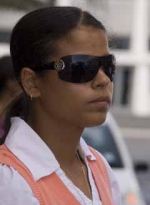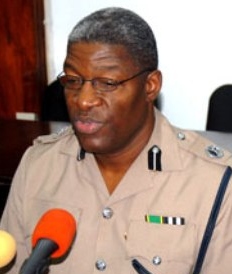Archive for October 31st, 2010

Gambling referendum pushed back to 2011
 (CNS): Despite his commitment to hold a referendum in November on the contentious subject of legalised gambling in the Cayman Islands the premier has said that the people’s vote will now not take place until next year. In June, the premier said that he wanted to settle the matter once and for all and was planning to have an official public ballot in November. The introduction of legalized gambling had been one of a number of potential new revenue sources put forward to government by the national investment council. Talk-show host and former politician, Gilbert McLean had also submitted a petition to government with some five hundred signatures.
(CNS): Despite his commitment to hold a referendum in November on the contentious subject of legalised gambling in the Cayman Islands the premier has said that the people’s vote will now not take place until next year. In June, the premier said that he wanted to settle the matter once and for all and was planning to have an official public ballot in November. The introduction of legalized gambling had been one of a number of potential new revenue sources put forward to government by the national investment council. Talk-show host and former politician, Gilbert McLean had also submitted a petition to government with some five hundred signatures.
Although this was not enough to trigger a people initiated referendum, the premier had said in order to get the opinion of the voting public and final settle what has been a long and contentious debate the premier said he would hold the ballot. However, he told Cayman 27 on Friday that the necessary legislation for a referendum had not yet been passed and therefore he thought thevote would probably take place some time early next year.
There are two methods by which a referendum can be instigated according to the Cayman Islands constitution the first is when members of the legislative assembly vote for a ballot and pass the necessary legislation for that vote the second is for a referendum initiated by the people. Anyone who gains the signatures of 25% of the electorate can force the legislature to hold a public vote.
However, as yet the government has not enacted the necessary legislation as required in the constitution to provide this democratic right to the people not just for on the subject of gambling to provide a way for any voter to press an issue they believe has the people’s support.
In this instance McLean did not gain the necessary signatures required to trigger the people initiated referendum but the premier had offered his support for the idea of a public vote given the possibility that either a national lottery or the introduction of casinos for tourist could bring in much needed revenue for government coffers.
However, although there was considerable support from the private sector for the idea the Cayman Ministers Association was still firmly against it. In the wake of the premier’s announcement that there would be a referendum the church representatives submitted a petition to government with over 1200 signatures against gambling.
The PPM has said publicly that it has always opposed and continues to oppose any form of legalised gambling. The only current serving member that has offered his public support for a national lottery is the independent member for North Side, Ezzard Miller.

Guns in toy case back in court
 (CNS): Following a mistrial in March of this year Cassandra Bodden (26) will be facing a jury for the second time on Monday as the case against her for the importation of firearms and ammunition’s returns to court.Bodden is charged with attempting to import four guns and 420 rounds of ammunition which were found hidden in a model car. Justice Howard Cooke ordered a re-trial when the jury of four men and three women could not agree on a verdict. The prosecution states that Bodden knew about the contents of the packageand claimed ignorance to cover her tracks. Bodden however has protested her innocence saying she did not know what was in the package and had made it abundantly clear she did not know to a number of law enforcement officials. (Photo Dennie WarrenJr)
(CNS): Following a mistrial in March of this year Cassandra Bodden (26) will be facing a jury for the second time on Monday as the case against her for the importation of firearms and ammunition’s returns to court.Bodden is charged with attempting to import four guns and 420 rounds of ammunition which were found hidden in a model car. Justice Howard Cooke ordered a re-trial when the jury of four men and three women could not agree on a verdict. The prosecution states that Bodden knew about the contents of the packageand claimed ignorance to cover her tracks. Bodden however has protested her innocence saying she did not know what was in the package and had made it abundantly clear she did not know to a number of law enforcement officials. (Photo Dennie WarrenJr)
When Bodden went to clear the package through a local shipping agent and customs, she did so in the company of a police officer. In the previous trial defence counsel Ben Tonner claimed that his client should never have been charged as she simply did not know about the guns and had alerted the authorities on several occasions to the fact that she was not expecting anything from the United States, which is where the package originated.
During the trial Tonner said that the arrest and charges against Bodden sent a terrible message to the community that by being honest people could find themselves in the same position — in court facing a risk to their liberty. The lawyer stated that if his client had remained quiet the inspection would never have happened and the guns could have made their way on to the street.
However the crown contends that Bodden knowingly imported the four firearms, described as a .40 Smith and Wesson, a 9mm Ruger, a .45 Glock model 21, and a 9mm Arcus as well as 420 bullets, in April 2009. Prosecutors say Bodden appeared to have knowledge of the content of the package without having been informed by the shipping agent and her failure to turn up for a planned inspection pointed to her guilt.

The law of unintended consequences
Interfering with well tested and well established laws and procedures, without strong evidence of genuine problems that must be addressed for the greater public good, is usually ill-advised. The current proposals to cap certain non-economic, particularly medical malpractice (medmal), damages awards for personal injury and to shorten the time periods within which claims for such injuries can be brought, appear to assume that there are significant and urgent problems in Cayman and that they must be solved in this way. Both assumptions are open to question.
There is much to be gained by developing a viable medical tourism industry and also by ensuring that the Cayman Islands has a cadre of competent medical professionals who are properly compensated for their services and protected against unjustified and vexatious litigation and excessive damages awards. (I will leave for another day the issue of general insurance carriers and vehicle accident personal injury claims.) Few woulddispute these points. But to then argue that we cannot enjoy these advantages unless we enact legislation to limit recourse against and compensation payable by those medical practitioners (or their insurance companies) found to be negligent seems a huge leap. It also begs the question as to who will pick up the cost of those who are so injured and not fully compensated and ignores the reputational risk for Cayman.
The Law Reform Commission has produced a very worthwhile report (LRC Report) on the issues. Its key conclusions are broadly valid and very compelling, i.e. the proposed changes are, in isolation, not well-founded and that alternatives should be pursued. The Government and the community should take very careful note of the conclusions.
The implicit assumptions behind the legislative proposals are that we have or may have an unfair and out of control legal and judicial system here that is customarily producing or will produce excessive awards for personal injuries and that produces inequity for defendants (medical practitioners and insurance companies) because claims are brought too long after the negligent event or omission occurred. The LRC Report properly concludes there is no evidence to support these assumptions as far as the Cayman Islands is concerned (indeed there is some suggestion that damages awards here are currently too conservative and do not fully compensate those injured).
There appear to be two specific concerns that have been identified and that drive the assumptions. First, certain categories of medical practitioners in Cayman have seen their insurance premiums increase dramatically over the past few years (although they are still much the same as in Bermuda and the Bahamas). The UK company that specialises in medical protection, the Medical Protection Society (a not-for-profit/mutual organisation), and provides the cover in Cayman states clearly that each country where it provides cover must be self financing. That means the performance of the medical practitioners it covers in Cayman is the basis of the calculation of the premiums (called “subscriptions”). This means that, if medical practitioners here produce high claims and awards (or the MPS thinks they will in the future), the premiums will increase to cover them or provide reserves to cover future claims. Likewise, if they produce low claims and awards (or the MPS thinks that the risks will go down), the premiums will reduce. This is broadly how insurance works the world over. It is a cost of professional practice, just as it is for lawyers, accountants and other professions. So the medical profession should review the way it practices in order to reduce the incidence and level of claims and explore other ways of obtaining (possibly less gold-plated) coverage for liability (as should the insurance industry), before lobbying Government for special legislative treatment that potentially prejudices injured persons.
Secondly, the agreement entered into by the Government to encourage medical tourism includes a provision that such legislation be introduced. Presumably on the basis that visitors (mainly from the US) using these medical facilities will bring with them increased vexatious litigation and excessive damages awards, i.e. effectively import US style malpractice litigation to our courts. That concern seems to fail to understand the fundamental and significant differences between the US and Cayman litigation systems. For starters, Cayman does not have contingency fees for lawyers or juries deciding damages awards. And the awards to-date by the courts are far from excessive and there is no reason to suppose that the approach of the courts here will change because of medical tourism (and history suggests that a US person who is injured by medical treatment here will find a way to bring the suit in the USA anyway).
The fact that these problems exist in other jurisdictions with completely different legal, social and judicial systems, and yet do not exist here, is no justification for importing the overseas solutions, the moreso when there is no hard evidence that these so called solutions have satisfactorily dealt with the actual problems elsewhere, or would actually deal with the problems adequately here if they did in fact exist!
So before rushing to limit legitimate compensatory awards for personal injuries due to medmal (or any other negligence such as in a car crash) and reducing the time periods for such claims, we should consider very carefully the public policy issues raised. And, in particular, how we as a society would provide for those (particularly in the less well off sector) who suffer such personal injuries and would be precluded from obtaining full and adequate compensation. There is currently (almost) no welfare safety net in Cayman. There is also no free lunch. So are those who ask for reduced liability prepared to pay taxes or levies to compensate those who suffer and lose out under the proposals? And have they asked themselves the critical question “Would my view of the proposals be the same if I or a family member was injured because of negligence”?
Related article: Law Reform Commission says don’t limit claims

Jamaican police release of force orders to the media
 (Jamaica Observer): Poilce Commissioner Owen Ellington, in his bid to increase transparency, has taken the unprecedented move to release the force orders to the media and by extension the general public. The force orders is a weekly internal police publication, which documents police transfers, commendations for officers who apprehend wanted men, destroy ganja fields and are outstanding in the line of duty. It also informs members of the constabulary of interdictions of officers who have ran afoul of force regulations. In addition, officers are alsoinformed of the deaths — whether by violent or natural means — of their colleagues and praises those successful in tertiary educational pursuits.
(Jamaica Observer): Poilce Commissioner Owen Ellington, in his bid to increase transparency, has taken the unprecedented move to release the force orders to the media and by extension the general public. The force orders is a weekly internal police publication, which documents police transfers, commendations for officers who apprehend wanted men, destroy ganja fields and are outstanding in the line of duty. It also informs members of the constabulary of interdictions of officers who have ran afoul of force regulations. In addition, officers are alsoinformed of the deaths — whether by violent or natural means — of their colleagues and praises those successful in tertiary educational pursuits.